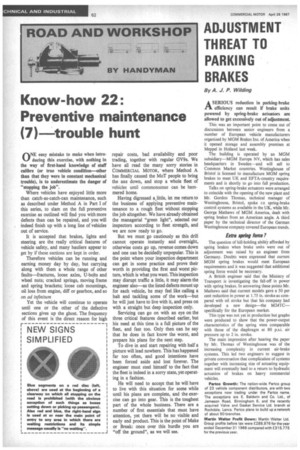ADJUSTMENT THREAT TO PARKING BRAKES
Page 64

If you've noticed an error in this article please click here to report it so we can fix it.
By A. J. P. Wilding A SERIOUS reduction in parking-brake ri efficiency can result if brake units powered by spring-brake actuators are allowed to get excessively out of adjustment This was an important point to come out of discussions between senior engineers from a number of European vehicle manufacturers organized by MGM Brakes Inc. of America when it opened storage and assembly premises at lvleppel in Holland Last week.
The building is operated by an MGM subsidiary—MGM Europa NV, which has sales headquarters in Sweden—and will sell to Common Market countries. Westinghouse of Bristol is licensed to manufacture MGM spring brakes to meet UK and EFTA-country requirements and is shortly to go into full production.
Talks on spring-brake actuators were arranged to coincide with the opening of the new plant and Mr. Gordon Thomas, technical manager of Westinghouse, Bristol, spoke co spring-brake control systems as available in the UK, while Mr. George Mathews of MGM America, dealt with spring brakes from an American angle. A third paper by the technical director of the German Westinghouse company covered European trends.
Extra spring force?
The question of hill-holding ability afforded by spring brakes when brake units were out of adjustment was raised by an engineer from Germany. Doubts were expressed that current MGM spring brakes would meet European requirements and it was suggested that additional spring force would be necessary.
A British engineer said that the Ministry of Transport is investigating the fall-off in power with spring brakes. In answering these points Mr. Mathews said that current models gave a 50 per cent reduction in power at L75 in. stroke as compared with nil stroke but that his company had developed a new design—the M24TCspecifically for the European market.
This type was not yet in production but graphs were produced to show that the power-output characteristics of the spring Were comparable
with those of the diaphragm at 80 air pressure up to 2 in. stroke.
The main impression after hearing the paper by Mr. Thomas of Westinghouse was of the increasing complexity in current air-brake systems. This led two engineers to suggest in private conversation that complication of systems together with increasing size of actuating equipment will eventually lead to a return to hydraulic actuation of brakes on heavy commercial vehicles.
Partco Growth; The nation-wide Partco group of 23 vehicle component distributors, are with two exceptions now trading under the Partco name. The exceptions are E. Baldwin and Co. Ltd., of Jameson Road, Birmingham 6, and the recently acquired valve and Gasket Service Ltd. branch at Rochdale, Lancs. Partco plans to build up a network of about 50 branches.
Martin Waiter Profit Down: Martin Walter Ltd. Group profits before tax were E289,976 for the year ended December 31 1966 compared with £315.775 for the previous year.
















































































































































































